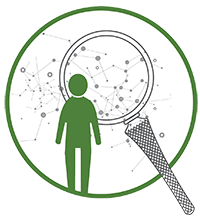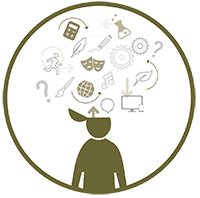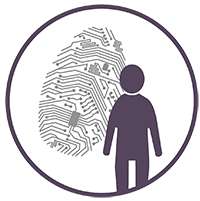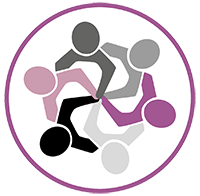
Critical thinking in ACE involves using criteria and evidence informed by business principles, data, evidence, personal understandings, and others’ understandings to make reasoned judgments and decisions.
- Learners source, manipulate, and process information using appropriate technology products and standards of business and commerce.
- Learners determine bias, relevance, reliability, and productivity of information and technology for use in business and industry.
- Learners analyze and synthesize emerging trends using criteria and evidence, demonstrating awareness of historical influences, sustainability, culture, and diversity.
- Learners understand how data sources, experiences, and perspectives from the business and broader community are rooted in certain contexts.
- Learners demonstrate flexibility to reconsider their thinking when presented with data sources and other evidence from the business and broader community.
- Learners enhance comprehension, clarify meaning, make connections, and expand experiences through questioning.
- Learners analyze problems in business and current trends, and make decisions based on evidence and systems thinking.
- Learners evaluate human, environmental, and financial practices to make ethical decisions about financial and environmental sustainability.

Creativity in ACE involves exploring and reflecting on trends and patterns in the world of business to generate and express innovative, responsive, and flexible models, plans, and solutions.
- Learners explore careers and fields of interest, and take risks to innovate new ideas in their field.
- Learners demonstrate curiosity in commerce by exploring new ideas/possibilities and asking relevant questions about their role in the global economy.
- Learners use a variety of strategies to find innovative solutions for meeting a need in society.
- Learners enhance innovative solutions to commerce learning by building on the ideas of current and emerging trends and the ideas of others.
- Learners use cyclical planning and make adjustments by evaluating trends, patterns, and connections, and by establishing business protocols to solve problems.
- Learners test and adapt planning models through scale and substitution to assess and predict obstacles for remediation.
- Learners use reflective practice and feedback to adapt and improve planning models.

Citizenship in ACE involves awareness of the interconnectedness of business with communities and world systems. It provides learners with the opportunity to work towards a sustainable world by fostering and valuing ethical relationships with oneself, colleagues, stakeholders, and the environment.
- Learners understand their own perspective on issues related to commerce at global regional and local levels.
- Learners evaluate factors such as the impact of equity, diversity, and inclusion on commerce, business, and human resources, and propose solutions to support well-being.
- Learners explore diverse viewpoints, experiences, and world views, and how they contribute to building business relationships and practices.
- Learners empathize with multiple viewpoints to better understand consumers, markets, workplaces, teams, and co-workers.
- Learners connect with others using appropriate, effective, and ethical workplace skills and practices to engage respectfully with others, both in person and in digital contexts.
- Learners explore opportunities where business and commerce can contribute to the well-being of individuals, communities, and larger systems.
- Learners analyze the role of business in society and work with others to find equitable solutions to support diversity, inclusivity, and human rights.
- Learners make ethical choices in their business and economic decision-making.

Connection to self in ACE involves the awareness of personal strengths, gifts, and challenges as they relate to global and local business systems. It allows for discovering and reflection on a learner’s personal engagement, attitudes, strengths, and future planning to become a lifelong learner.
- Learners explore their identity as consumer vs. producer, leader vs. follower, and boss vs. employee to discover more about their strengths, values, needs, and purpose.
- Learners identify the impact that economic systems and work environments can have in shaping how people see themselves and the roles they hold in society.
- Learners use workplace skills and practices to enhance self-regulation, personal comfort, sense of being, and efficiency.
- Learners—individually and with support from others—reflect on their contributions, experiences, and role identities through various learning experiences.
- Learners recognize and pursue personal and professional development opportunities, and set goals for growth to expand their experience.
- Learners create a career plan that reflects their strengths and interests.
- Learners value and practise resilience as they work through mistakes and overcome obstacles.
- Learners modify and adapt planning when presented with obstacles or new information.
- Learners are prepared, independent, and confident in decision-making regarding future pathways.

Collaborationin ACE involves setting shared goals, and contributing individual and collective strengths, unique attributes, and skills. Learning will be broadened through sharing perspectives, understandings, and experiences.
- Learners welcome diverse viewpoints, experiences, and world views, and appreciate how they contribute to building business relationships and practices.
- Learners build on each other’s ideas through discussion, sharing stories, models, and simulations, and incorporate this learning into their practice.
- Learners recognize and value the importance of each learner’s contributions based on their skills and talents.
- Learners formulate questions of themselves and others to generate new ideas and deepen understanding.
- Learners work through differences, and show a willingness to compromise or change perspective by demonstrating effective conflict resolution and appropriate business etiquette and protocols.
- Learners work in a team environment using traditional and digital formats to co-construct, design, and manage business projects.
- Learners commit to their role in common goals, projects, or tasks using workplace skills and ethical decision-making.

Communication in ACE involves managing messaging for clarity and understanding in diverse contexts, and making meaningful and purposeful connections within the world of business and commerce.
- Learners use business language and terminology while demonstrating appropriate business etiquette and protocols.
- Learners select appropriate mediums of business communication while considering audience and purpose.
- Learners understand how their words and actions shape their identity or have an impact.
- Learners explore persuasive messaging and ethics in marketing and business communication.
- Learners understand business protocols and practices, and use them to understand and interpret messages.
- Learners use a variety of business-informed conventions to understand and engage others in professional, informative conversations.
- Learners consider and contextualize how perspectives can inform business models’ styles and scope.
- Learners deepen meaning by incorporating the language of business and commerce into their learning.
- Learners make connections and build relationships in the business community, both in person and in digital contexts.
- Learners recognize the importance/impact of communication in understanding community dimensions, team building, and networking.





